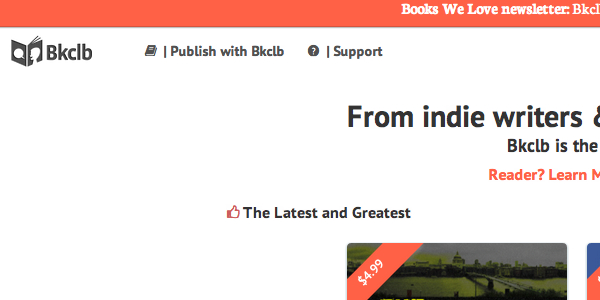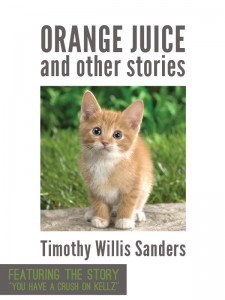Behind the Scenes
Bkclb is a cool new way to buy eBooks

I’m a big fan of anything that has to do with publishing but ISN’T publishing (like Submittable and Vouched), so naturally I was intrigued by Bkclb, a new and Australian eBook seller that’s geared directly toward indie lit. I started using them for PGP books and I really like everything about it. Shit don’t cost too much. They got the new Lifted Brow and some Dzanc Books and this Sententia book that’s all the rage.
I asked Connor Tomas O’Brien, who runs the show over there, a bunch of questions a while ago (see below) and now Bkclb is coming out of Beta, so to celebrate checkitout: go here, enter “HTMLGiantSux” and you can get the eBook of Timothy Willis Sanders’s excellent Orange Juice for free. Try it out, see what you think, say what you think in the comment box below, provided by Disqus, here’s the what why when who how:
What’s your own background?
I’m a writer and a front-end web designer based down in Adelaide, Australia. I work on online stuff for different publishing houses, which lets me indulge my interest in the relationship between “literary” writing and the web. Last year I started work on a PhD dissertation looking at the collision between web culture and book culture, but that project’s splintered (as PhD projects tend to do) into the shape of a novel about fanfic and video games, and Bkclb, which is an ebookstore that draws on a lot of the research that’s been kicking around in my head.
What inspired you to start Bkclb?
Last year, I was looking to publish an illustrated collection of short stories online. I remember searching for a great place to sell it, but I was kinda coming up empty. What I was looking for was the equivalent of a little indie bookstore, with everything nicely laid-out and at least somehow curated. I find most ebookstores feel either like megastores or bargain basements, and none really fit. In the end, I decided to give my story collection away. After that, I was asked a bunch of times whether I knew of something like Bandcamp, but for writers: a space to sell ebooks easily that fosters a more personal and direct connection between buyer and seller. Seemed like a good project to get stuck into.
Explain to me what Bkclb is, how it works.
Bkclb is basically a platform of author/publisher-managed bookstores. As a reader, you move through these different stores, each of which looks and feels a little different, depending on how the publisher has set things up (it’s not going to feel like Myspace, but it’s going to feel more fun than clicking through Amazon).
Why would anyone buy a book from Bkclb instead of Amazon or B&N?
When you buy a book, the payment flows directly to the publisher or author, so you’re not left wondering about how much of your money will actually reach the author you’d like to support. In terms of why a reader would buy from Bkclb instead of Amazon, all Bkclb titles will be platform agnostic and DRM-free, which means that you won’t be locked to any specific device, and you’ll be able to read using platforms like Readmill (which everyone should check out – it’s pretty neat).
Where do you see Bkclb in 5 years?
It’s hard to tell. We’ve got an insanely long list of ideas we’d like to play around with. There’s so much of the publishing industry that could be disrupted, and so many problems to solve. We’d like to think of ways to foster tight-knit communities using ebooks as the focal point, but in a way that doesn’t feel stupid or gimmicky.
There have been attempts at online bookselling, but no one has been able to sustain it. I’m thinking of Authors Book Shop for example, which was probably too far ahead of its time. Recently The Lit Pub made a brief attempt at doing it. What’s different for you?
I think jumping in at the right time is a huge deal. Big publishers like Pan Macmillan are experimenting with DRM-free ebooks, interesting startups like Readmill are emerging, and both my parents just bought Kindles—so, y’know, all the pieces are in place. We’ve thought about how to create something fundamentally different, a model that hopefully makes small publishers and authors get excited. Our attitude is also that we want to be continually moving forward. I think in online bookselling, it’s easy to get left behind. I think the only way to avoid failing is to keep asking publishers and readers, “What do you want next?”
Are there any good self-published books that people should be reading?
Everything by Robin Sloan. Joey Comeau’s Bible Camp Bloodbath. Frank Chimero’s The Shape of Design. I’m also really excited by Jack Cheng’s These Days, which he’s funding over on Kickstarter.
Are self-published books getting better, or is there just more of it, or is the mainstream just paying more attention?
Some self-published books are getting better (see above). Honestly, I find the term “self-published” sets off alarm bells. I find that it’s necessary to distinguish those who happen to create and sell their own high-quality books to those who are part of the “self-publishing community.” The “self-publishing community,” in my eyes, is a bubble, and it’ll die down as soon as people realise that uploading their vampire novella and spamming strangers on Twitter won’t make them rich and famous. Good writers who just so happen publish their own work, I’ve noticed, never identify themselves as “self-publishers.” A lot of writers associated with HTMLGiant, for example, publish their own work online, but I don’t think many associate themselves with the self-publishing community. Anyway, Bkclb is for those kinds of writers: those who are publishing their own stuff because they’re intelligent and experimental, not because they’ve signed up to some bogus get rich quick scheme.
The platform—or whatever, the website—is beautiful. How many people are on the Bkclb team?
Two. I work with Fred Fan, a developer who writes magical code. I handle design and working with publishers and writers. Fred does the tricky stuff. He’s kind of a genius.
 It’s also a very stripped-down interface. What kind of work went into figuring out what to include, what you don’t need, and how to present it?
It’s also a very stripped-down interface. What kind of work went into figuring out what to include, what you don’t need, and how to present it?
The goal was to create an interface that would let you get from creating an account to selling an ebook to your first customer in five minutes. I also really like incorporating cartoony flourishes: I pop little illustrations throughout the interface so that it feels friendly, because that’s a big deal.
Can you compare your services to other eBook sellers, like Diesel eBooks?
All the other ebook sellers have their place, and I think Diesel, for example, is doing neat things. Unlike Diesel and others, though, Bkclb lets publishers and authors manage how they sell directly. Bkclb operates like a mall full of different small bookstores, each of which is well-curated by an expert. There’s something more personal about it. If you’re familiar with Bandcamp, you can see where we’re coming from: Bandcamp is ostensibly pretty similar to something like the iTunes Music Store, but when you buy from Bandcamp, you feel as though you’re purchasing from the maker directly. That intimacy and directness is difficult to quantify, but it’s something I find really important.
What’s your favorite device to eRead on?
The Kindle. Say what you will about Amazon, but that e-ink screen is still magical to me.
Tags: Bkclb, Connor Tomas O'Brien

Looks good, but not sure I agree with this: Good writers who just so happen publish their own work, I’ve noticed, never identify themselves as “self-publishers.”
There’s no always or never with self-publishing.
Hi Henry,
Yeah, probably shouldn’t have jumped into absolutes there. What I meant is: it’s important to distinguish the act of self-publishing from the fairly insular “self-publishing community” that has emerged around stuff like Amazon KDP. There are some amazing “self-publishers” that we wouldn’t even think of as “self-publishers” because they don’t trumpet the fact and/or don’t feel the need to associate themselves with that particular community.
OK – just that I’m one of those writers who puts out non-mainstream stuff and hates the get-rich-quick attitude of some self-publishers, and I’m still attached to the mantle of self-publishing. I don’t like the idea that KDP publishers are THOSE types of writers, and the good writers are over here. There are plenty of people putting out interesting work on KDP.
Yeah, I don’t see a reason to create a distinction. Everyone “knows it when they see it.”
For sure. A platform can be used in many ways, by many different communities. Neverless
I’d say the primary reason to make a distinction would be to encourage those who may have a knee-jerk reaction to “self-publishing” to recognise great quality work exists in that space. There is a great vibrancy to work that is self-produced, but the “self-publishing” tag simply carries too much baggage. This is very difficult to tease out in short comments, but I may give this some more thought on the Bkclb blog next week.
I’ve been waiting exactly for a “Bandcamp for books”. I started reading the interviewee’s book not knowing it’s him, pretty funny and the preview system is awesome.
Imagined myself telling someone about my book. “It’s on bkclb, ‘bookclub’ without the vowels dot com.”
Love the idea, and have been poking through the catalog. It would be nice to have the authors’ names listed clearly with the titles; the names aren’t always legible on the cover images.
That’s a good point. Definitely this is something to wonder about. I hope you link back with your post. It’s something I would like to think about in more depth here, too.
I think we’re too early in the process to make any definitive statements about these communities. Certainly, the Kindle revolution has been driven by commercial fiction. “Literary” readers are slow to come on board. But they will. So it’s too early to say “self-publishing has too much baggage” as below, especially when the stigma is being shed daily.
I get if this site is supposed to be a platform for more-serious fiction, but denigrating self-publishing just seems to crap on writers, rather than help them.
looks interesting…i feel i’ve exhausted amazon and am looking to transition to a “bandcamp for book”